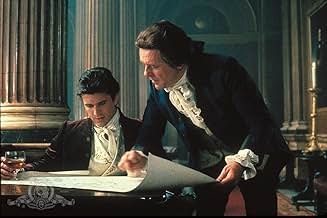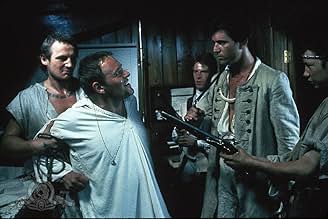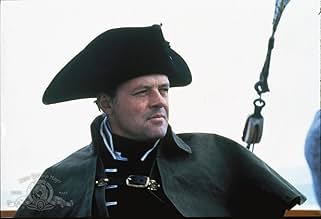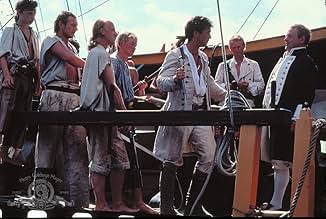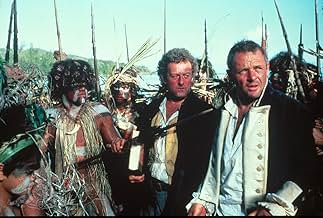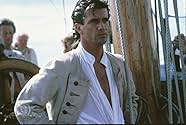En 1787, le lieutenant Bligh commande un bateau, le Bounty, pour un voyage de 50 000 Km. Sa tyrannie amène l'équipage à la revolte.En 1787, le lieutenant Bligh commande un bateau, le Bounty, pour un voyage de 50 000 Km. Sa tyrannie amène l'équipage à la revolte.En 1787, le lieutenant Bligh commande un bateau, le Bounty, pour un voyage de 50 000 Km. Sa tyrannie amène l'équipage à la revolte.
- Réalisation
- Scénario
- Casting principal
- Récompenses
- 2 nominations au total
- Young
- (as Philip Davis)
Avis à la une
This is filled with great actors. They are all good. The older versions have Bligh as the villain and Christian as the hero. This one isn't quite so simplistic. Christian is more of a blank for the most part while Bligh tries to be sympathetic as much as he's allowed. Hopkins isn't doing a crazed dictator as usual but a needy outsider. I'm not sure about the constant back and forth between the time periods. The later time period adds very little to the movie. It is far too long already. The movie needs to get to Tahiti earlier. The turn in Tahiti is terrific with Hopkins finding another gear. The film looks beautiful. If Roger Donaldson could push the pace more and reduce the over 2 hour running time, this could be an even better film.
Bligh was a very good seaman, an excellent navigator, and a firm but fair ship's captain. There were far worse than him in the Royal Navy. His 3,500+ mile voyage in a small open boat with his loyal crew members has never been bettered.
After the slander of the two previous films in the 30's and 60's, this film gives a far more accurate and sympathetic portrayal of Bligh, and Anthony Hopkins is excellent as always.
If this film was made today with the same cast then it would not have had the same effect because it would have tried to win over it's audience with it's cast but the likes of Day Lewis, Liam Neeson and Mel Gibson were still unknowns in most countries and it was like an older version of the rat pack as they were the fresh faces coming up in the movies in 80's Hollywood especially for Gibson who just made action in the 80's apart from The Bounty and Gallipoli. What makes this movie all the more better was it's haunting soundtrack by Vangelis. Every scene in the film which contains a piece from the soundtrack is just spine tingling and the scene where Fletcher takes over the ship and the men are gathering together to mutiny is just fantastic.
It's not the best film ever but it feels like it when you watch it but then you take it in and you think of some of the scenes they could have included. A few more scenes between Bligh and Fletcher wouldn't have gone a miss and a bit more on Laurence Oliver's character but what we did see of him was more than enough and I shouldn't complain.
Unlike some of the previous comments for this film I think it is pretty loyal to the true historical facts of the real mutiny. Alright, there are a few minor changes to fact, but nothing that radically alters the story. Basically Bligh was a very able and fair captain, who was let down by incompetent officers. Bligh was no more a monster than any other Royal Navy captains, the difference was other Royal Navy Captains had able commissioned officers and a squad of marines to back up their authority. Bligh was on his own, because the admiralty insisted on saving money on the bread-fruit expedition by giving Bligh a small ship and no officers. (All the officers on board were non-commissioned warrant officers, who were not employed by the Royal Navy but were in it for their own advancement, Blight was the only Royal Navy officer). This is what ultimately led to the mutiny. Bligh had no one he could rely on to back up his orders from the Admiralty. Bligh was actually an exponent of modern thinking, and treated his men with much more humanity than other Royal Navy Captains. He had learnt his trade from sailing under Captain Cook.
I think Hopkins manages to capture this in his performance. Bligh was a professional man, who grew increasingly frustrated by the incompetence and laziness of his officers. Hopkins manages to convey this sense of increasing irritation brilliantly. He felt particularly let down by Fletcher Christian, who was his friend and whom he had personally advanced up the ranks. He expected Fletcher to back up his orders, but Fletcher was more interested in his own pleasure with the Tahitian women.
On the journey out the crew were actually very happy and contented, but the trouble began when the crew began to experience the liberties and freedoms of Tahitian life, and they did not want to leave it. Bligh had to force the men to go back to their duty, and instead of having officers to back him up, the officers took the side of the men.
I think the script of this film captures the true story quite well. I saw the Clark Gable version of the story many years ago, and the only thing I remember is the portrayal of Bligh as an irrational monster, with none of the reasons behind his anger explained. In this version I feel Hopkins is more like the real Bligh. An able commander trying to carry out his orders, but let down by those around him.
The confrontation between Bligh and Christian in the captain's cabin the day before the mutiny is one of my favourite movie scenes of all time. Hopkins performance of the captain at the end of his patience is just outstanding. `Oh there are rumblings are there?'. Superb!
The only down side to this film is Mel Gibson. I can't stand the sight of him! Mind you, even he manages to pull of a good performance.
The film ends quite abruptly, with a lot of loose ends. The most fascinating parts of the true story come after the end of the film. I guess the time constraints of the film mean they had to concentrate on just the story of the mutiny.
The mutineers set up a colony on Pitcairn, and ended up all murdering each other until only one survived (Jack Adams). Those that stayed on Tahiti were captured two years later by HMS Pandora which had been dispatched after Bligh got back to England. This ship rounded up about 16 mutineers, and on the way home the Pandora hit a reef off Australia and sunk. The crew had to make an open boat journey to Coupang, the same port that Bligh's life boat had arrived at two years earlier!!
Meanwhile Bligh was promoted and sent off on another Breadfruit exhibition to Tahiti, this time the Admiralty gave him commissioned officers and a squad of marines. This mission succeeded.
When the Breadfruit plants finally reached the slave colonies in the West Indies, the slaves refused to eat the fruit as they disliked the taste. That's irony for you!
Mel Gibson plays Fletcher Christian who must watch helplessly as his captain(Hopkins) demoralizes his men and drives them ever closer to the brink of mutiny. The tension builds throughout the film and in no small part to the excellent score. The disgruntled crew has many recognisable faces including Liam Neeson and Bernard Hill which makes the film all the more enjoyable. Daniel Day Lewis is particularly watchable as mr. frier, showing us a rather smug and sometimes fiery officer. The film is shot beautifully and the story is compelling. Even the script holds up in a film where the best performances come from the actors with the least to say.
Le saviez-vous
- AnecdotesMel Gibson was disappointed with his performance and the finished movie. He later said of the movie, "I think the main problem with that film was that it tried to be a fresh look at the dynamic of the mutiny situation, but didn't go far enough. In the old version, Captain Bligh was the bad guy and Fletcher Christian was the good guy. But really Fletcher Christian was a social climber and an opportunist. They should have made him the bad guy, which indeed he was. He ended up setting all these people adrift to die, without any real justification. Maybe he'd gone island crazy. They should have painted it that way. But they wanted to exonerate Captain Bligh while still having the dynamic where the guy was mutinying for the good of the crew. It didn't quite work."
- GaffesWhen Bligh, Fryer and Christian are in Bligh's home planning the voyage, Bligh refers to a route that would take them around the coast of 'Australia'. But at the time of the Bounty's voyage in 1789 what we now know as Australia was instead universally called New Holland - a name which also appears on Bligh's map and which he later uses after being cast adrift. 'Australia' only came into common usage in the early 19th century; it gained official status in 1824.
- Citations
Lt. William Bligh: We are still faced with a long, hard voyage. I mean to make good use of every hour of sailing time, and to assist me in this, I am replacing Mr. Fryer with Mr. Christian, who will now act as executive second in command, with the rank of Acting Second Lieutenant...
[Fryer walks away]
Lt. William Bligh: Mr. Fryer, come back here.
[shouts after Mr. Fryer, who is continuing to walk away]
Lt. William Bligh: Mr. Fryer, sir! Come back here!
[Mr. Fryer returns; Bligh continues, quietly]
Lt. William Bligh: I will dismiss when I have done with you, sir. Do you hear me?
John Fryer: This is an outrage!
Lt. William Bligh: Mr. Fryer!
John Fryer: In all my years at sea...
Lt. William Bligh: Your "years at sea"? Good Lord, man! If I'd known your nature, I would not have accepted you as boatswain of a river barge.
John Fryer: Must I suffer this before the men?
Lt. William Bligh: You will suffer my correction whenever you're at fault, sir!
John Fryer: What fault?
Lt. William Bligh: [shouts] God damn your eyes, man! You turned your back on me!
John Fryer: Well for that, I apologize.
Lt. William Bligh: Very well.
John Fryer: But I protest.
Lt. William Bligh: You protest, do you?
John Fryer: I am Master of the Bounty!
Lt. William Bligh: [shouts] And I, sir, am *Commander*! By law! I am the first! Do you understand? God damn your hide! And now you may dismiss, sir!
- Versions alternativesGerman version misses ca. 26 minutes.
- ConnexionsFeatured in The Making of 'The Bounty' (1984)
Meilleurs choix
Détails
- Date de sortie
- Pays d’origine
- Langue
- Aussi connu sous le nom de
- The Bounty
- Lieux de tournage
- Moorea, Polynésie Française(South Seas locations)
- Sociétés de production
- Voir plus de crédits d'entreprise sur IMDbPro
Box-office
- Budget
- 25 000 000 $US (estimé)
- Montant brut aux États-Unis et au Canada
- 8 613 462 $US
- Week-end de sortie aux États-Unis et au Canada
- 2 622 306 $US
- 6 mai 1984
- Montant brut mondial
- 8 613 462 $US
- Durée
- 2h 12min(132 min)
- Couleur
- Mixage
- Rapport de forme
- 2.39 : 1


